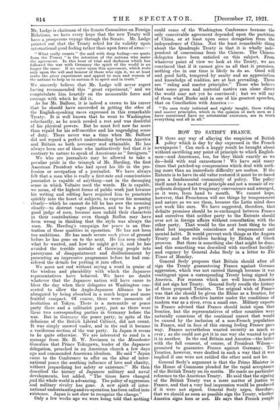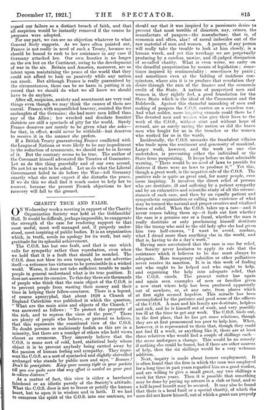HOW TO SATISFY FRANCE.
IS there any way of allaying the suspicion of British policy which is day by day expressed in the French newspapers ? Can such a happy result be brought about without sacrificing any point of principle to which English- men—and Americans, too, for they think exactly as we do—hold with real earnestness ? We have said many times that patched-up compromises which deal with noth- ing more than an immediate difficulty are useless. If the Entente is to have its old value restored it must be re-based upon a fundamental community of policy. The policy itself must be a matter of principle and not a mosaic of ex- pedients designed for temporary convenience and arranged, as it were, from hand to mouth. We cannot hope, however, that Frenchmen will see things by temperament and nature as we see them, because the Latin mind does not work like ours. We have suggested, therefore, that definite promises should be re-exchanged between France and ourselves that neither party to the Entente should ever act in foreign affairs without consultation with the other party. That would be the next best thing to the ideal but impossible coincidence of temperament and mental habit. It would prevent such things as the Angora Treaty and- the reckless backing by Britain of Greek prowess. But there is something else that might be done, and this something was described with excellent lucidity and cogency by General John Seely in a letter to The Times of Monday.
General Seely proposes that Britain should after all sign the Treaty guaranteeing France against German aggression, which was not carried through because it was contingent upon a corresponding Treaty being signed by America. For reasons which are well known America did not sign her Treaty. General Seely recalls the history of these proposed Treaties. The original wish of France was that she should be given the Rhine as a frontier, for there is no such effective barrier under the conditions of modern war as a river, even a small one. Military experts in France advised that France should insist upon that frontier, but the representatives of other countries were naturally conscious of the continual unrest that would be caused by the inclusion of a non-French population in France, and in face of this strong feeling France gave way. France nevertheless wanted security as much as ever ; as she could not get it in one way she wanted to get it in another. In the end Britain and America—the latter with the full consent, of course, of President Wilson— promised to guarantee France against Germany. The Treaties, however, were drafted in such a way that it was implied if one were not ratified the other need. not be.
General Seely's argument is that the Prime Minister in the House of Commons pleaded for the rapid acceptance of the British Treaty on its merits. He made no particular reference to the American Treaty. He said that the signing of the British Treaty was a mere matter of justice to France, and that a very bad impression would be produced if it were not signed. General Seely urges, therefore, that we should as soon as possible sign the. Treaty, whether America signs hers or not. He says that French people regard our failure as a distinct breach of faith, and that all suspicion would be instantly removed if the course he proposes were adopted. For- our -part, we can see no objection whatever to what General Seely suggests. As we have often pointed out, France is not really in need of such a Treaty, because we should be bound to rush to her assistance in any case if Germany attacked her. Our own frontier is no longer on the sea but on the Continent, owing to the development of war in the air. Britain and America, moreover, are so intent upon maintaining the peace of the world that they could not afford to look on passively while any nation ran amok. But although France is really guaranteed by the circumstances, there can be no harm in putting it on record that we should do what we all know we should have to do anyhow.
After all, suspicion, anxiety and resentment are very real things even though we may think the causes of them are unreal.' France, with unparalleled bravery, resisted the first onslaughts of the Germans; she had more men killed than any of the Allies ; her wrecked and desolate frontier districts are still a spectacle of pity for the world. Surely France deserves not merely to be given what she asks— for that, in effect, *mid never be withheld—but deserves to receive it in the manner she prefers. If a British Treaty guaranteeing France conflicted with the League of Nations, or were likely to be any impediment to the reduction of armaments, we should not be in favour of it. But the contrary seems to be true. The author of the Covenant himself advocated the Treaties of Guarantee. Let us do this thing gracefully and of our own accord. Do not let us wait to be asked. Let us do what the Liberal Government failed to do before the War—tell Germany exactly what she must expect if she disturbs the peace. If we do this we shall find it much easier to help her to recover, because the present French objections to her recovery will fall to the ground.







































 Previous page
Previous page